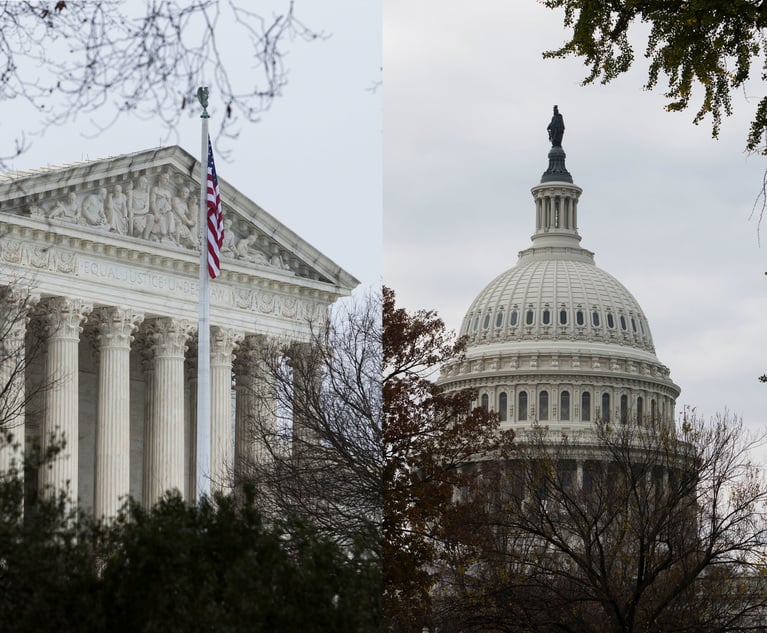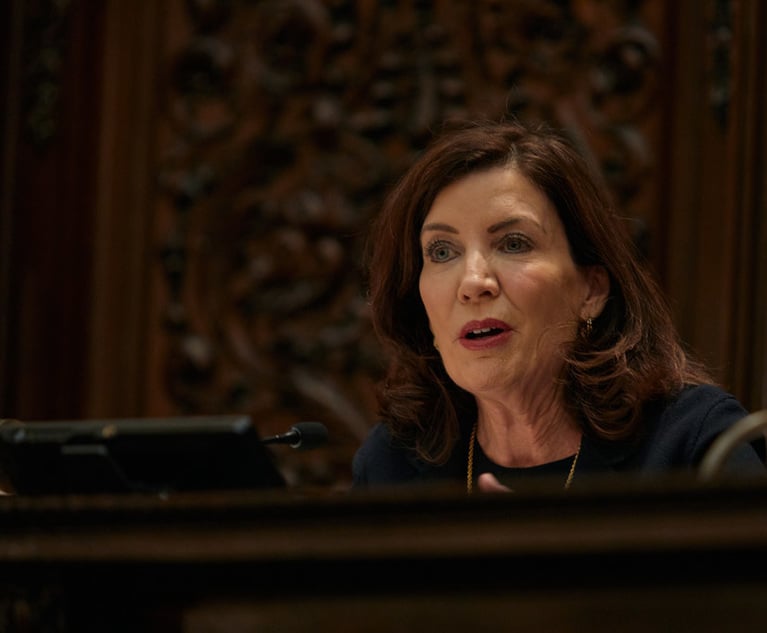 Advertisement seen inside the D.C. Metro system in Washington, D.C. Photo: Tony Mauro/ALM
Advertisement seen inside the D.C. Metro system in Washington, D.C. Photo: Tony Mauro/ALM The Marble Palace Blog: Seven Years of Trying to Fix the Supreme Court
After seven years of trying, Fix the Court is chalking up fixes that are coming to fruition at the Supreme Court.
December 15, 2021 at 04:19 PM
7 minute read
Thank you for reading The Marble Palace Blog, which I hope will inform and surprise you about the Supreme Court of the United States. My name is Tony Mauro. I've covered the Supreme Court since 1979 and for ALM since 2000. I semiretired in 2019, but I am still fascinated by the high court. I'll welcome any tips or suggestions for topics to write about. You can reach me at [email protected].
In 2014, Gabe Roth boldly launched an organization called Fix the Court, aimed at reforming the U.S. Supreme Court, an institution that doesn't really think it needs fixing.
A longtime communications and public affairs consultant, Roth was not fazed. He told me at the time, "Change is coming. Fix the Court is building a movement of Americans fed up with the court's lack of honesty and openness and we won't be going anywhere until it cleans up its act."
With help from the New Venture Fund, Roth began a media campaign, plastering the Metro with his motto that the Supreme Court was the "most powerful, least accountable" institution in Washington. Now a nonprofit with a small staff, Fix the Court receives grants and donations from the likes of the Hewlett Foundation.
Some of the fixes Roth has advocated for are coming to fruition. And his admonition that "change is coming" and Americans are "fed up" with the court has certainly come to pass. He doesn't claim total credit for reforms, but he does say, "We've led the charge for a number of measures SCOTUS has begun to accommodate: oral argument, livestreaming, digitized disclosure reports, the sale of half of the justices' individual stocks. The justices are even 'studying' whether to have an ethics code." He often pings the court when justices have overlooked conflicts of interest.
The organization has won praise from members of Congress. "Fix the Court has been a steadfast ally in the fight for transparency and accountability at the Supreme Court," Sen. Sheldon Whitehouse, D-Rhode Island, said in a statement, "Long before Trump's justices took the bench, big and powerful special interests launched a campaign to capture the court and achieve through its power what they could never achieve through the elected branches of government. Gabe Roth and the Fix the Court team have fought back relentlessly against those forces, pushing for reforms to restore Americans' faith in the court's independence."
The scope of Fix the Court has widened to include lower federal courts as well. Bills that are pending in Congress may bring livestreamed appellate arguments, free PACER, wellness initiatives, online financial disclosures and more lower court judgeships.
Roth has also weighed in on Supreme Court term limits and other issues discussed in the Biden Supreme Court Commission. He's not happy. We caught up with Roth for an interview:
Are you surprised that some of the legislation/reforms you've been pushing for from the beginning are now starting to move ahead? Why is that happening?
I'm not surprised. I think that in the post-Trump era, much like in the post-Nixon era, there's been a general realization that we need more accountability from our public officials, and I believe the public and their representatives in Congress see the judiciary as a part of that, especially given the third branch's increasingly partisan bent. Also, I think that the Supreme Court and the judiciary's administrative arm have overplayed their hands in terms of their insistence that reform is not possible. They told us judges and justices don't need to follow the same disclosure and stock ownership rules as top officials in the other branches because jurists conduct themselves on a higher ethical level than members of Congress. They told us the judiciary could handle its harassment problem, but time and again that hasn't been the case. And people who are serious about reform are now sitting in positions of power and are unburdened by the oversight requirements of the Trump era. For example, the chair of the Courts Subcommittee in House Judiciary, Hank Johnson, D-Georgia, is a former judge who gets the needs for greater judicial accountability. His counterpart, Darrell Issa, R-California, is himself a former chair of the subcommittee who cares about oversight and isn't intimidated by judiciary officials and their overwrought talking points.
As for the Supreme Court, did you ever think they would make changes, small as they may be?
If I thought the Supreme Court would never change, then I probably wouldn't have started Fix the Court. What I've noticed, though, is that change is more likely to happen when people the justices are close with, or whose opinions they care about, advocate for it. Think about how it was the chief justice's former law school roommate, Richard Lazarus, who convinced the court in 2015 to be more transparent about changes the justices make to opinions after they're handed down. So more than, say, me writing another letter to the chief on livestreaming, if I can convince a former clerk to write that letter or the chair of a Senate Judiciary Committee, or if I can get a member of Congress to ask SCOTUS about their lack of an ethics code or whether they'd support ending life tenure—all of which I've been able to do—that moves the conversation and action on reform further along.
I know you were not happy about the presidential commission. Why do you think they did not come up with any significant recommendations?
Even though Biden's charge was "no recommendations," I was disappointed that certain arguments were given air time in the final report. For example, saying "a term limits statute might not be constitutional" is ridiculous; what's "constitutional" is what five justices say at a given time, and each passing week it seems we learn that things once thought to be constitutional are no longer. By my count, four or five current justices seem to be fine with term limits; three-fourths of the country wants them; and there's an 18-year term limits bill in Congress.
What is an untouched reform that you would like to see happening in years to come?
Among those that I'm most interested in is one you and I have spoken about in the past, which is a Supreme Court Records Act akin to the Presidential Records Act. I think Chief Justice [John] Roberts accidentally gave that a boost when during the Dobbs [v. Jackson Women's Health Organization] oral argument he decried the fact that justices' papers are made public at all. Fact is that papers being locked away for 50-plus years is indecorous.
When you have interactions with Supreme Court staff and justices, are you treated as persona non grata?
Everyone I've interacted with at the Supreme Court has been cordial. When I reach out, it tends to be to inquire about what I perceive to be a missed recusal or a missing travel reimbursement on a disclosure report, and if anything, they're appreciative. They know my goal is not to bring the court down but to bring it into the 21st century. In terms of the justices themselves—yes, I've interacted with more than one over the years, but for better or worse these interactions were off the record and shall remain that way.
NOT FOR REPRINT
© 2025 ALM Global, LLC, All Rights Reserved. Request academic re-use from www.copyright.com. All other uses, submit a request to [email protected]. For more information visit Asset & Logo Licensing.
You Might Like
View All
Roberts Calls Court's Relationship With Congress 'Strained.' Who's to Blame?

Judicial Conference Declines Democratic Request to Refer Justice Thomas to DOJ

Senate Judiciary Dems Release Report on Supreme Court Ethics

Reported Refusal to Officiate Gay Wedding Prompts Review by NY Judicial Misconduct Watchdog
Trending Stories
- 1Uber Files RICO Suit Against Plaintiff-Side Firms Alleging Fraudulent Injury Claims
- 2The Law Firm Disrupted: Scrutinizing the Elephant More Than the Mouse
- 3Inherent Diminished Value Damages Unavailable to 3rd-Party Claimants, Court Says
- 4Pa. Defense Firm Sued by Client Over Ex-Eagles Player's $43.5M Med Mal Win
- 5Losses Mount at Morris Manning, but Departing Ex-Chair Stays Bullish About His Old Firm's Future
Who Got The Work
J. Brugh Lower of Gibbons has entered an appearance for industrial equipment supplier Devco Corporation in a pending trademark infringement lawsuit. The suit, accusing the defendant of selling knock-off Graco products, was filed Dec. 18 in New Jersey District Court by Rivkin Radler on behalf of Graco Inc. and Graco Minnesota. The case, assigned to U.S. District Judge Zahid N. Quraishi, is 3:24-cv-11294, Graco Inc. et al v. Devco Corporation.
Who Got The Work
Rebecca Maller-Stein and Kent A. Yalowitz of Arnold & Porter Kaye Scholer have entered their appearances for Hanaco Venture Capital and its executives, Lior Prosor and David Frankel, in a pending securities lawsuit. The action, filed on Dec. 24 in New York Southern District Court by Zell, Aron & Co. on behalf of Goldeneye Advisors, accuses the defendants of negligently and fraudulently managing the plaintiff's $1 million investment. The case, assigned to U.S. District Judge Vernon S. Broderick, is 1:24-cv-09918, Goldeneye Advisors, LLC v. Hanaco Venture Capital, Ltd. et al.
Who Got The Work
Attorneys from A&O Shearman has stepped in as defense counsel for Toronto-Dominion Bank and other defendants in a pending securities class action. The suit, filed Dec. 11 in New York Southern District Court by Bleichmar Fonti & Auld, accuses the defendants of concealing the bank's 'pervasive' deficiencies in regards to its compliance with the Bank Secrecy Act and the quality of its anti-money laundering controls. The case, assigned to U.S. District Judge Arun Subramanian, is 1:24-cv-09445, Gonzalez v. The Toronto-Dominion Bank et al.
Who Got The Work
Crown Castle International, a Pennsylvania company providing shared communications infrastructure, has turned to Luke D. Wolf of Gordon Rees Scully Mansukhani to fend off a pending breach-of-contract lawsuit. The court action, filed Nov. 25 in Michigan Eastern District Court by Hooper Hathaway PC on behalf of The Town Residences LLC, accuses Crown Castle of failing to transfer approximately $30,000 in utility payments from T-Mobile in breach of a roof-top lease and assignment agreement. The case, assigned to U.S. District Judge Susan K. Declercq, is 2:24-cv-13131, The Town Residences LLC v. T-Mobile US, Inc. et al.
Who Got The Work
Wilfred P. Coronato and Daniel M. Schwartz of McCarter & English have stepped in as defense counsel to Electrolux Home Products Inc. in a pending product liability lawsuit. The court action, filed Nov. 26 in New York Eastern District Court by Poulos Lopiccolo PC and Nagel Rice LLP on behalf of David Stern, alleges that the defendant's refrigerators’ drawers and shelving repeatedly break and fall apart within months after purchase. The case, assigned to U.S. District Judge Joan M. Azrack, is 2:24-cv-08204, Stern v. Electrolux Home Products, Inc.
Featured Firms
Law Offices of Gary Martin Hays & Associates, P.C.
(470) 294-1674
Law Offices of Mark E. Salomone
(857) 444-6468
Smith & Hassler
(713) 739-1250








